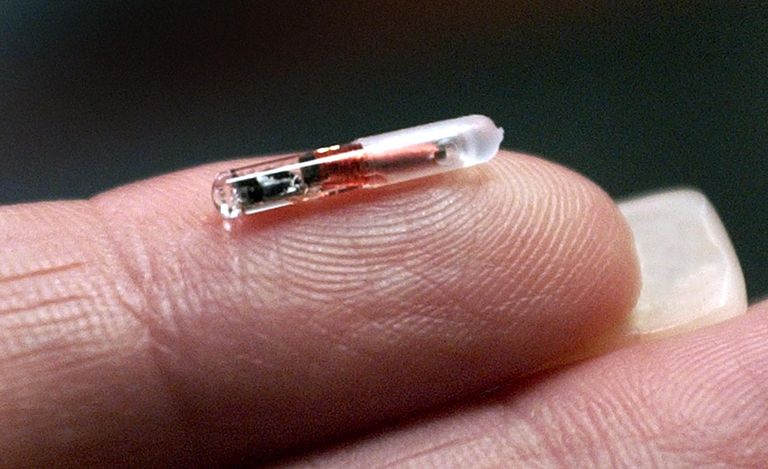Post by Admin on Jul 7, 2020 9:34:56 GMT
Michigan Makes Worker Microchips Voluntary ... Wait, What?
It's protection we didn't even know we needed.
BY COURTNEY LINDER

If you adopted your pet from a rescue shelter, they probably have a microchip embedded just beneath the skin on the back of their neck. It's a tiny radio-frequency identification (RFID) chip that's no larger than a grain of rice, and it helps you find your furry friend if they ever get lost.
Now, in a strange twist, you could also have a microchip just like it, as some companies have adopted the tracking technology in lieu of keys or traditional building access badges.
Last week, however, the Michigan House of Representatives took a preemptive strike against the technology, passing a bill to make the microchips voluntary in the state. The Microchip Protection Act would allow Michigan employers to use microchipping, but could in no way force employees to participate.
"With the way technology has increased over the years and as it continues to grow, it's important Michigan job providers balance the interests of the company with their employees' expectations of privacy," Rep. Bronna Kahle, the Republican who sponsored the bill, said in a press statement.
She continued:
"Microchipping has been brought up in many conversations as companies across the country are exploring cost-effective ways to increase workplace efficiency. While these miniature devices are on the rise, so are the calls of workers to have their privacy protected."
Worker microchips first made headlines in 2017 when 50 out of 80 employees at a Wisconsin company called Three Square Market voluntarily opted into the implant at a "chip party."
In a press release at the time, the company said employees had the option to "voluntarily implant an RFID microchip between the thumb and forefinger underneath the skin" that "does not have tracking capabilities, [and] will allow employees to make purchases in the company's break room market, open doors, log in to computers, and use copy machines."
It's protection we didn't even know we needed.
BY COURTNEY LINDER

this photo taken 10 may 2002 shows the verichip, wRHONA WISEGETTY IMAGES
Although not yet a mainstream practice, some companies have forced workers to get microchips implanted in their fingers to replace building access badges.
These are radio-frequency identification chips (RFID) that biohackers have long embraced to push the limits of their bodies.
The Michigan House of Representatives has taken a preventive measure against the tech, passing a bill on June 24 to make microchipping voluntary.
Now, in a strange twist, you could also have a microchip just like it, as some companies have adopted the tracking technology in lieu of keys or traditional building access badges.
Last week, however, the Michigan House of Representatives took a preemptive strike against the technology, passing a bill to make the microchips voluntary in the state. The Microchip Protection Act would allow Michigan employers to use microchipping, but could in no way force employees to participate.
"With the way technology has increased over the years and as it continues to grow, it's important Michigan job providers balance the interests of the company with their employees' expectations of privacy," Rep. Bronna Kahle, the Republican who sponsored the bill, said in a press statement.
She continued:
"Microchipping has been brought up in many conversations as companies across the country are exploring cost-effective ways to increase workplace efficiency. While these miniature devices are on the rise, so are the calls of workers to have their privacy protected."
Worker microchips first made headlines in 2017 when 50 out of 80 employees at a Wisconsin company called Three Square Market voluntarily opted into the implant at a "chip party."
In a press release at the time, the company said employees had the option to "voluntarily implant an RFID microchip between the thumb and forefinger underneath the skin" that "does not have tracking capabilities, [and] will allow employees to make purchases in the company's break room market, open doors, log in to computers, and use copy machines."











